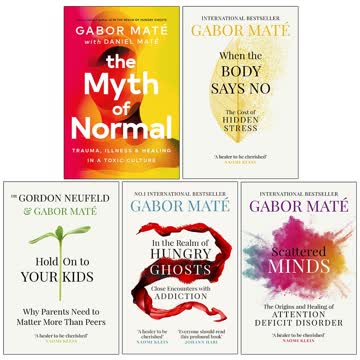つの重要なポイント
1. ストレスと感情の抑圧は慢性疾患の主要な要因である
「私たちが『ノー』と言うことを学ぶのを妨げられたとき、私たちの体が代わりにそれを言うかもしれない。」
ストレスは外部の出来事だけではない。 それは身体が物理的または感情的な脅威を感じたときの反応である。特に抑圧された感情からくる慢性的なストレスは、身体の自然なバランスを乱し、さまざまな病気を引き起こす可能性がある。
感情の抑圧は学習された行動である。 しばしば子供時代の経験に由来し、時間が経つにつれて有害になることがある。特に怒りを表現するのが苦手な人々は、慢性疾患を発症しやすい。
- 感情の抑圧の一般的な兆候:
- 他人に「ノー」と言うのが難しい
- 自分のニーズより他人のニーズを優先する
- 慢性的な疲労や原因不明の痛み
- 感情を特定したり表現したりするのが難しい
2. 子供時代の経験がストレス反応と健康結果を形作る
「世代は箱の中の箱である:母の暴力の中には別の箱があり、その中には祖父の暴力があり、その箱の中には(推測だが確信はないが)また別の箱があり、何か黒く秘密のエネルギーがある—物語の中の物語、時間の中で後退する。」
早期の人生経験は重要である。 子供時代にどのように扱われたかが神経系とストレス反応を形作る。この「プログラミング」は一生続き、ストレス要因に対する反応や病気に対する感受性に影響を与える。
世代間のトラウマは現実である。 未解決の感情的な問題は世代を超えて伝わり、元のトラウマに直接さらされていない家族の健康にも影響を与える。これは家族のパターンを解決し、癒すことの重要性を強調している。
- 成人の健康に影響を与える子供時代の主な要因:
- ケアギバーとの愛着の質
- 慢性的なストレスやトラウマへの曝露
- 感情的なサポートと承認
- 健康的な対処メカニズムの学習
3. 心身のつながりは病気を理解するために重要である
「心が病気を引き起こすのではない。心と体は同じ生きた有機体の切り離せない側面である。」
体と心は相互に関連するシステムである。 伝統的な医学はそれらを別々の存在として扱うことが多いが、研究は私たちの思考、感情、そして身体の健康が深く結びついていることを示している。この理解は病気の予防と治療の両方にとって重要である。
心理神経免疫学(PNI)は重要な分野である。 この学際的な研究は、心理的プロセスが神経系および免疫系とどのように相互作用するかを調査する。これは、ストレスや感情が身体の健康にどのように影響するかを理解するための科学的基盤を提供する。
- 心身のつながりが現れる方法:
- ストレスホルモンが免疫機能に影響を与える
- 感情が心拍数や血圧に影響を与える
- 慢性的な不安が消化問題を引き起こす
- ポジティブな思考が治癒率を向上させる
4. 自己免疫疾患は未解決の感情的な葛藤から生じることが多い
「自己免疫疾患では、体の防御機能が自己に対して向かう。」
内部の葛藤が身体に現れる。 自己免疫疾患、つまり体が自己を攻撃する病気は、内部の感情的な葛藤の物理的な現れと見なすことができる。これはしばしば、境界を主張したり、健康的に怒りを表現することができない人々に起こる。
子供時代の経験が役割を果たす。 多くの自己免疫疾患の患者は、他人のニーズに応えるために自分のニーズを抑えなければならなかった困難な子供時代を報告している。この自己否定のパターンは成人期にも続き、病気の原因となることがある。
- 自己免疫患者に共通する感情パターン:
- 怒りを表現するのが難しい
- 他人のニーズを優先する傾向
- 完璧主義と高い自己期待
- 未解決の子供時代のトラウマや無視
5. がんの発症は心理的および社会的要因に影響される
「病気のリスクを生み出すのは外部のストレスではない。それは心理生理学的なストレス反応である。」
がんは遺伝だけではない。 遺伝的要因が役割を果たす一方で、心理的および社会的要因もがんの発症と進行に大きく影響する。慢性的なストレス、感情の抑圧、社会的サポートの欠如はすべてがんのリスクを高める可能性がある。
性格特性が脆弱性を高める。 研究は、がん患者に共通する「タイプC」と呼ばれる性格特性を特定している。これには、感情、特に怒りを表現するのが難しいことや、自分の費用で他人を喜ばせる傾向が含まれる。
- がんに影響を与える心理的要因:
- 慢性的なストレスとコルチゾールレベル
- 感情の抑圧、特に怒りの抑圧
- 社会的孤立やサポートの欠如
- 未解決のトラウマや長期的なうつ病
6. 治癒には身体的および感情的な側面の両方に対処する必要がある
「治癒することは全体になることである。」
ホリスティックなアプローチが必要である。 真の治癒は身体的な症状の治療を超えている。それは病気に寄与する感情的、心理的、社会的要因に対処することを必要とする。これには、セラピー、ライフスタイルの変更、より良い対処メカニズムの開発が含まれる。
自己認識が重要である。 自分の感情パターン、ストレス反応、未解決の問題を理解することは、治癒プロセスの重要なステップである。この自己認識は、より効果的な介入とライフスタイルの変更を可能にする。
- ホリスティックな治癒の要素:
- 身体的な症状に対する医療治療
- 心理療法やカウンセリング
- ストレス軽減技術(例:瞑想、ヨガ)
- 社会的なつながりとサポートの向上
- 未解決のトラウマや感情的な問題に対処する
7. 感情的な能力を発展させることは長期的な健康に不可欠である
「感情的な能力は、健康にリスクをもたらす隠れたストレスから自分を守るために必要なものであり、治癒するために取り戻す必要があるものである。」
感情的な能力はスキルである。 それは自分の感情を認識し、理解し、効果的に管理する能力を含む。このスキルは、ストレスに対処し、健康な人間関係を維持するために重要である。
学び、改善することができる。 子供時代に強い感情的な能力を発展させなかったとしても、大人になってからこれらのスキルを改善することは可能である。これには、セラピー、自己反省、新しい感情の表現と管理の方法を練習することが含まれる。
- 感情的な能力の主要な要素:
- 感情とその引き金に対する自己認識
- 感情を効果的に表現する能力
- 他人の感情を理解する共感
- 感情を管理し、調整するスキル
- 意思決定に感情を活用する能力
8. ネガティブな思考の力がポジティブな健康結果をもたらすことがある
「真のポジティブな思考は、私たちの現実のすべてを含むことから始まる。それは、どんな真実であれ、私たちがその完全な真実に直面することを信頼できるという自信に導かれる。」
ネガティブな感情を受け入れることは健康的である。 一般的な信念に反して、常にポジティブな思考を追求することは有害である可能性がある。ネガティブな感情を認識し、処理することは感情的な健康にとって重要であり、より良い身体的な結果をもたらすことがある。
自己に対する正直さが鍵である。 自分の人生、関係、感情についての困難な真実に直面する能力は、弱さではなく強さである。この正直さは、根本的な問題を隠す表面的なポジティブさではなく、真の治癒と成長を可能にする。
- 「ネガティブな思考」の利点:
- 自己認識の向上
- 感情のより良い処理
- 問題解決能力の向上
- 感情を抑圧することによるストレスの軽減
- より本物の関係
9. 受容と意識は治癒の基盤である
「受容とは、物事がどのようであるかを認識し、受け入れる意欲である。」
受容は諦めではない。 それは判断なしに現実をそのまま認識することである。この受容は変化と治癒の基盤を作り、現実と対立するのではなく、現実と共に働くことを可能にする。
意識は注意を払うことを含む。 これは自分の体、感情、思考に注意を払うことを意味する。パターンや引き金を認識する能力を発展させることが、ポジティブな変化をもたらすために重要である。
- 受容と意識を育むためのステップ:
- マインドフルネス瞑想を実践する
- 思考や感情のジャーナルをつける
- 定期的に身体の感覚を確認する
- 信頼できる他者からのフィードバックを求める
- セラピーやカウンセリングに参加する
10. 怒りを健康的に表現することは全体的な幸福に不可欠である
「怒り、またはその健康的な経験は、治癒の七つのAの一つである。」
怒りは自然な感情である。 すべての感情と同様に、怒りには目的がある。それは境界の侵害、不正、または満たされていないニーズを示すことができる。問題は怒りそのものではなく、それがどのように表現されるか、または抑圧されるかである。
健康的な怒りの表現はスキルである。 それは感情を認識し、その原因を理解し、自分や他人に害を与えない方法でそれを表現することを含む。このスキルは練習によって発展させることができ、しばしば不健康なパターンを学び直すことを必要とする。
- 怒りを健康的に表現する方法:
- 「私」メッセージを使って感情を表現する
- コミュニケーションにおいてアサーティブネスを実践する
- 緊張を解放するために身体活動に従事する
- 怒りの感情について書いたりジャーナルをつける
- 怒りを理解し管理するためにセラピーを求める
最終更新日:
FAQ
What's When the Body Says No about?
- Exploring hidden stress: The book examines the link between stress and physical illness, focusing on how unresolved emotional issues can lead to chronic diseases.
- Mind-body connection: Dr. Gabor Maté presents a biopsychosocial model, showing how emotional and psychological states affect physical health.
- Healing through awareness: The author advocates for recognizing and addressing emotional pain as a pathway to healing.
Why should I read When the Body Says No?
- Insightful perspective on health: It offers a unique viewpoint on how emotional and psychological factors contribute to physical health.
- Practical advice for healing: Maté provides actionable insights for addressing emotional issues to improve health.
- Real-life case studies: The book includes compelling stories that illustrate the mind-body connection.
What are the key takeaways of When the Body Says No?
- Stress impacts health: Chronic stress and emotional repression can lead to physical illnesses like autoimmune diseases and cancers.
- Importance of emotional expression: Acknowledging and expressing emotions, especially anger, is crucial for reducing stress and promoting healing.
- Healing requires self-awareness: Engaging in self-reflection and confronting emotional histories can empower healthier choices.
What are the best quotes from When the Body Says No and what do they mean?
- “The body says no.” This phrase highlights that the body manifests illness when emotional needs are ignored.
- “Pain is a powerful secondary mode of perception.” It suggests that physical pain signals unresolved emotional issues.
- “The repression of negative emotions is a major risk factor for disease.” This underscores the need for emotional expression for health.
How does Dr. Gabor Maté define stress in When the Body Says No?
- Stress as a response: Stress is the body's reaction to perceived threats, whether physical or emotional.
- Chronic stress consequences: Unresolved emotional issues can lead to chronic stress, impacting health.
- Mind-body interaction: Stress has real biological consequences, not just psychological ones.
What specific methods does When the Body Says No suggest for healing?
- Emotional awareness and expression: Recognizing and expressing emotions, particularly anger, is crucial for reducing stress.
- Therapeutic interventions: Psychotherapy and other therapeutic approaches help process emotions and facilitate healing.
- Mindfulness and self-care: Practices like mindfulness and meditation promote emotional well-being.
How does When the Body Says No relate to autoimmune diseases?
- Autoimmune diseases and stress: Emotional repression can trigger autoimmune diseases, highlighting the need for emotional health in treatment.
- Case studies: Patient stories illustrate how unresolved emotional issues contribute to autoimmune diseases.
- Holistic approach to treatment: Addressing emotional and psychological factors is vital for a comprehensive understanding of health.
What role does childhood experience play in health, according to When the Body Says No?
- Impact of early relationships: Childhood experiences shape emotional responses and coping mechanisms, influencing health outcomes.
- Transgenerational patterns: Unresolved issues in one generation can affect subsequent generations, emphasizing family dynamics in health.
- Emotional deprivation: Emotional deprivation in childhood can lead to difficulties in managing stress as adults.
How can I apply the concepts from When the Body Says No to my life?
- Self-reflection: Examine your emotional history to understand the connection between emotions and physical well-being.
- Emotional expression: Practice expressing emotions in healthy ways to reduce stress and promote healing.
- Seek support: Engage in therapy or support groups to explore emotional experiences and learn coping strategies.
What is the significance of the mind-body connection in When the Body Says No?
- Interconnectedness of health: Emotional health significantly impacts physical health, emphasizing the mind-body connection.
- Physiological responses to emotions: Emotions can trigger physiological responses that affect overall health.
- Holistic healing approach: Addressing emotional needs is part of a holistic approach to health and healing.
What does When the Body Says No say about the importance of emotional expression?
- Reducing stress: Expressing emotions, especially anger, is crucial for reducing stress and promoting healing.
- Avoiding repression: Repressed emotions can lead to physiological stress responses that harm the body.
- Pathway to healing: Emotional expression is a vital component of health and healing.
How does When the Body Says No challenge conventional medical narratives?
- Emotional factors in health: It emphasizes the role of emotional and psychological factors in physical health, challenging traditional views.
- Biopsychosocial model: Maté presents a model that integrates emotional, psychological, and social factors in understanding health.
- Patient stories: Real-life case studies illustrate the profound impact of emotional health on physical conditions.
レビュー
『When the Body Says No』は賛否両論の評価を受けている。多くの読者はこの本を洞察に満ちたものと見なし、心身のつながりやストレスが健康に与える影響を強調している。本書の精神神経免疫学の探求と、そのわかりやすい文体は称賛されている。しかし、一部の人々は逸話的な証拠や有名人の伝記に頼りすぎていると批判している。批評家たちは、この本が複雑な健康問題を単純化しすぎており、患者が自分の病気を引き起こしたと非難する可能性があると主張している。これらの懸念にもかかわらず、多くの読者は全体的な健康とストレス管理に関する視点に価値を見出している。
Similar Books















